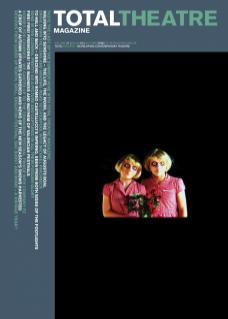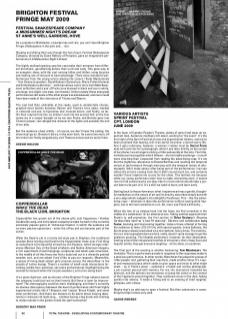In the foyer of Camden People’s Theatre, plates of party food wear an expectant look. Audience members mill about, waiting for ‘the event’. It’s the first night of the Sprint Festival of new and experimental theatre, and we’ve been promised that teasing, will-it-be-awful incentive: a launch party. Before it gets underway, however, a woman I realise must be Harriet Poole asks me to join her for a photograph, which I see later, briefly, on the screen of her phone; two strangers smiling a little awkwardly at the lens. The little, intimate journey together which follows – the (in)visible exchange – is much more charming than I expected from reading the advertising copy. It’s not that the highbrow references to Roland Barthes and ‘pushing the temporal nature of performance through marrying with the temporal nature of photography’ didn’t make sense; after being part of the performance I can see where the artist is coming from. But it didn’t sound much fun, and certainly wouldn’t have inspired me to pay for the show. This bothers me because while our young performers learn how to make interesting work, it seems rarer to find someone who can describe it in terms which would make a person keen to be part of it. It’s a skill we need to learn, and learn early.
Getting back to the performance: what I experienced was a gentle, thoughtful meditation on the nature of art and its brevity, described simply but with a wry edge which nudged it into delightful freshness. This – like the advertising copy – attempts to describe performance without saying what happens, but to tell more would be to ruin. Ah, now I see Poole’s difficulty…
When the two of us emerge back into the foyer, we find ourselves in the middle of a celebration. Or an attempt at one. Taking another approach than Poole’s to self-promotion, the first section of Chloé Déchery’s Showing Up describes itself as ‘a bad PR exercise’. Déchery and collaborator Lucy Foster, devising and improvising together, make a brave attempt at forcing the audience to have LOTS OF FUN, with special guests, brave balloons, the Sprint press release read aloud via a microphone, fancy dress. The culmination is a choreographed dance which, sadly, doesn’t quite manage to get the audience gyrating. The likeable performers, however, do their damnedest. Casting around their desperate handfuls of streamers, their cheap Cava and hopeful smiles, they get everyone laughing – at the show, at ourselves.
The final part of the evening is another beckoning: Tom Marshman’s The Invitation. This is a performance made in response to the responses made to a previous performance. In other words, Marshman has played to groups of ‘older people’ and, gathering their reactions, made another show. It’s a quiet and measured piece which seeks to give space and voice to what might seem – as in Poole’s piece – ephemera: a faded and curling photograph, a pin-cushion pierced with memory. For me, the characters remained too abstract, and the delivery too monotone, to grasp the colour or the context of the fragments pieced together. They remained voices in the dark, fading quickly into silence. It made a fitting end to an evening of brief laughter, glimpses, anti-climax.
Maybe that’s an odd way to open a festival. But then subversion is something that Sprint does very well.

